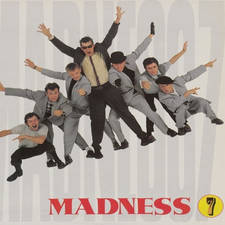Why Eric Clapton's hit cover of 'I Shot The Sheriff' left Bob Marley fuming
21 November 2023, 13:43 | Updated: 15 January 2024, 12:37

Listen to this article
"I shot the sheriff, but I didn't shoot no deputy".
We know all the classic chorus to Bob Marley and the Wailers' reggae standard, about someone wrongly accused of killing the deputy, when he instead shoots a sheriff who has been harassing him.
Of course, Marley didn't actually shoot a sheriff. He did reveal that some parts of song were true, but not which parts.
The truth behind the song is that shooting the sheriff was in fact a spiritual metaphor about birth control.
In 2011 documentary Bob Marley: The Making of a Legend, Bob's ex-lover explained the sheriff in the song was her doctor, who called the pills he prescribed as "elements of wickedness".
- Bob Marley's 15 greatest songs, ranked
- 'No Woman No Cry' by Bob Marley: The making of the reggae crossover smash hit
- Bob Marley biopic: One Love trailer, cast, plot, release date and more revealed
- QUIZ: How well do you know Bob Marley's lyrics?
It's fairly obvious in lyrics like: "Every time I plant a seed/He said kill it before it grow", though the meaning might've not seemed blatant at first.
Bob Marley was a man who championed peace and prosperity, so acts of violence weren't exactly in his character, for anyone who took the song literally.
Though there was one instance where he was uncharacteristically angry, and guitar legend Eric Clapton was the catalyst.
Clapton famously covered 'I Shot The Sheriff' and took it to the top of the US, New Zealand and Canadian music charts, but it overshadowed Marley's original even in his home country of Jamaica.

Bob Marley & The Wailers - I Shot The Sheriff (Live At The Rainbow Theatre, London / 1977)
According to John Masouri's 2008 book, Wailing Blues — The Story of Bob Marley's Wailers, Marley was happy for Clapton to cover his song.
Though he kept the song's meaning close to his chest, telling him some of the lyrics he'd written were true, but not which ones.
Regardless of the song's original intent, it became an anthem against injustice and corruption, which still resonates to this day.
Eric Clapton took 'I Shot The Sheriff' to the top of the US Billboard charts, which featured on his 1974 album 461 Ocean Boulevard, a year after Marley's version was originally released.
It's still the only ever number-one single Eric Clapton scored, and the hit record increased Bob Marley and the Wailers' visibility around the world, especially within the rock music crowds that would've never been exposed to reggae prior.
Marley was riled, however, when Clapton's Westernised rendition was receiving more airplay in his home country.

Reggae music is intrinsically Jamaican, and its rise globally was closely associated with Rastafarianism, of which Bob was a believer.
Rock greats at the time like Clapton and John Lennon were vocal fans of reggae, and no doubt helped raise Bob Marley and the Wailers' international profile.
But the music genre was a celebration of Jamaican culture, Jamaican life, and Jamaican beliefs, and yet local radio stations would play Clapton's version over and over.
In Stephen Davis' 1985 biography, Bob Marley, he wrote that Marley was infuriated by Clapton's cover received much heavier rotation on local airwaves, with his latest single 'Natty Dread' being left by the wayside.
Evidently irked by the lack of airplay, Marley broke his peaceful mantra and went to local radio station JBC to confront the local DJs.

Eric Clapton (Live 1977) I Shot The Sheriff.mpg
- Eric Clapton's 10 greatest songs ever, ranked
- Inside the George Harrison, Eric Clapton and Pattie Boyd love triangle
- Eric Clapton pays homage to hero Willie Nelson with touching cover of 'Always On My Mind'
- Eric Clapton releases stunning Jeff Beck cover of 'Moon River' recorded before his death

Nowadays, it's difficult to imagine Eric Clapton's appropriate version trumping Bob Marley's original if it came to a contest.
But that's reported what happened - according to Davis' book, Marley's music was continuing to be ignored so he confronted the DJs on a second occasion.
He wrote that after Bob and his friend "Skill" Cole paid a visit to JBC, one of the DJs went to the police to complain that the star had threatened him.
Out of character, for sure, but entirely understandable - it took time for reggae to gain global adoration, and Bob Marley was ensuring that a Jamaican's authentic representation was going to fly the reggae flag.







